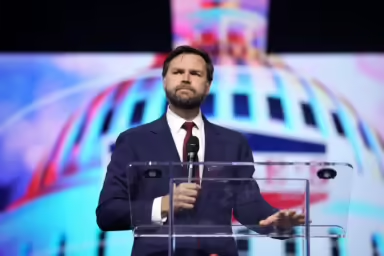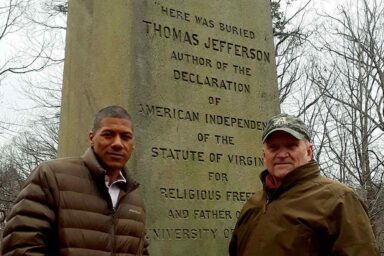Poem: ‘Prescription’ — My Pre-Dawn Vision of a Darkening World
Silencing artists, attacking scientists, and whitewashing history are sure signs that Donald Trump is a despot bent on absolute power.
|
Listen To This Story
|
The Trump/MAGA suspension of Jimmy Kimmel is obviously an attack on freedom of speech, and obviously an attempt to quell all public criticism of an increasingly unpopular and power-mad would-be despot.
But it is also an attack on art itself, and artists everywhere — anyplace where the creative force bubbles up and thrives, whether in poetry, fiction, satire, drama, comedy, music, dance, visual arts, film, graffiti, or at some open mic.
It’s even an attack on the artists who bring their vision and discernment to the world in the plain old prose of commentary, as we do here at WhoWhatWhy.
It can fairly be said that Donald Trump, seething with envy, hates and fears artists — at least those who do not bow down and sing his praises. He knows the terrible threat that, collectively, they pose.
As he hates and fears scientists and intellectual “elites” — whose capabilities, training, and dedication he cannot hope to approach, but whom he believes he can put in their place and triumph over by the exercise of power.
By, for example, taking over the Kennedy Center (where ticket sales have since plummeted).
Indeed, it should now be clear that Trump is driven by a most terrible inner force — the pain of emotional rejection and belittlement. Beginning with his own parents and eventually broadening to New York high society and all the business “elites” that barred him from their “club.”
And, ultimately, the political “elites” and media “elites” who scorned him and became relentless in their critiques once he gained and began abusing power.
It makes for a terribly long list and a dial that is set and stuck on Revenge, tragically ignorant of the fact that no amount of triumph, destruction, and trembling or transactional feigned admiration will bring him contentment and true peace. As his clinical psychologist niece, Mary Trump, comprehensively summed it up in the title of her book, for Donald Trump it’s always been “too much and never enough.” That’s what we’re watching play out on the world stage.
Of course, there are specific targets. The authoritarian playbook dictates that you knock off your critics one by one, make examples of them, frighten the others, and potential others, into murmuring or silence.

But the need to triumph, in a being whose soul is as damaged and mangled as Trump’s, or Stephen Miller’s, is effectively boundless. In a sense, it’s not their fault — they are, psychologically, programmed thus. The dial is stuck. They cannot stop.
So here’s to the scientists and the thinkers, all those who dedicate their lives and skills and training and work to humanity’s great ongoing attempt to understand the world in all its complexity and mystery — and, in the vast majority of cases, to better it.
And here’s to the artists, who create, in whatever form, to edify and to connect. Perhaps to heal their own wounds — constructively — and in the process to help others find and heal their own.
The ever-insightful and incisive Steve Schmidt delved into this dynamic this week, in the course of which he presented a long excerpt from one of John F. Kennedy’s last speeches, delivered at Amherst College on October 26, 1963.
JFK’s words, with gratitude to Steve:
When power leads men towards arrogance, poetry reminds him of his limitations.
When power narrows the areas of man’s concern, poetry reminds him of the richness and diversity of his existence.
When power corrupts, poetry cleanses. For art establishes the basic human truth which must serve as the touchstone of our judgment.
The artist, however faithful to his personal vision of reality, becomes the last champion of the individual mind and sensibility against an intrusive society and an officious state.
The great artist is thus a solitary figure. He has, as Frost said, a lover’s quarrel with the world. In pursuing his perceptions of reality, he must often sail against the currents of his time.
This is not a popular role.
If Robert Frost was much honored in his lifetime, it was because a good many preferred to ignore his darker truths.
Yet in retrospect, we see how the artist’s fidelity has strengthened the fibre of our national life.
If sometimes our great artists have been the most critical of our society, it is because their sensitivity and their concern for justice, which must motivate any true artist, makes him aware that our Nation falls short of its highest potential.
I see little of more importance to the future of our country and our civilization than full recognition of the place of the artist.
If art is to nourish the roots of our culture, society must set the artist free to follow his vision wherever it takes him. We must never forget that art is not a form of propaganda; it is a form of truth.
And as Mr. [Archibald] MacLeish once remarked of poets, there is nothing worse for our trade than to be in style. In free society art is not a weapon and it does not belong to the spheres of polemic and ideology.
Artists are not engineers of the soul. It may be different elsewhere.
But democratic society — in it, the highest duty of the writer, the composer, the artist is to remain true to himself and to let the chips fall where they may.
In serving his vision of the truth, the artist best serves his nation.
And the nation which disdains the mission of art invites the fate of Robert Frost’s hired man, the fate of having “nothing to look backward to with pride, and nothing to look forward to with hope.”
I look forward to a great future for America, a future in which our country will match its military strength with our moral restraint, its wealth with our wisdom, its power with our purpose.
I look forward to an America which will not be afraid of grace and beauty, which will protect the beauty of our natural environment, which will preserve the great old American houses and squares and parks of our national past, and which will build handsome and balanced cities for our future.
I look forward to an America which will reward achievement in the arts as we reward achievement in business or statecraft.
I look forward to an America which will steadily raise the standards of artistic accomplishment and which will steadily enlarge cultural opportunities for all of our citizens.
And I look forward to an America which commands respect throughout the world not only for its strength but for its civilization as well.
And I look forward to a world which will be safe not only for democracy and diversity but also for personal distinction.
Robert Frost was often skeptical about projects for human improvement, yet I do not think he would disdain this hope.
As he wrote during the uncertain days of the Second War:
Take human nature altogether since time began… And it must be a little more in favor of man, say a fraction of one percent at the very least…
I know it was long — by today’s standards, at least — but it was very meaningful, and inspiring, to me, and I hope you, too, found it worthwhile.
Hamlet says, comparing his murdered father to his murdering and usurping uncle, “Like Hyperion to a satyr.”
John Fitzgerald Kennedy. Donald John Trump.
I wrote a poem earlier this week — inspired by my present experience convalescing from illness, bedridden while the world outside seemed to catch fire and begin smoldering.
I had not planned to publish it. But after Trump’s move on Kimmel, and his naked threats to all who create that which does not please His Majesty, I changed my mind.
It is not, I think, a great poem. It captures only the view from my bed in the wee hours before dawn. But it does speak to the moment and the darkness rolling in like a Category 5 storm from which the only evacuation would be silent submission.
That, I have no plans to do. And I hope and pray neither do you.
***
prescription
given valtrex for my shingles
a big blue pill to be taken
ten days at eight hour intervals
i set my alarm for 4 a m
groping for the bottle in the black
where my ribcage seethes and tingles
while in the closed laptop to my right
in some time zone where the sun is bright
widens as with every morn the crack
the pairing off of us and them
with all i once relied upon now shaken
and each day freshly galls
the prescription just another sop
the shuffling parade of hours
as the dawns returning rosy fingers slice
forever into shrinking days
and i no better and no worse
friends with pain and pain
knowing they have cast the dice
knowing they will never stop
the centrifugal power hungry powers
my laptop closed like the casket in a hearse
all peace to lose and not a thing to gain
opening it to the suns new rays




